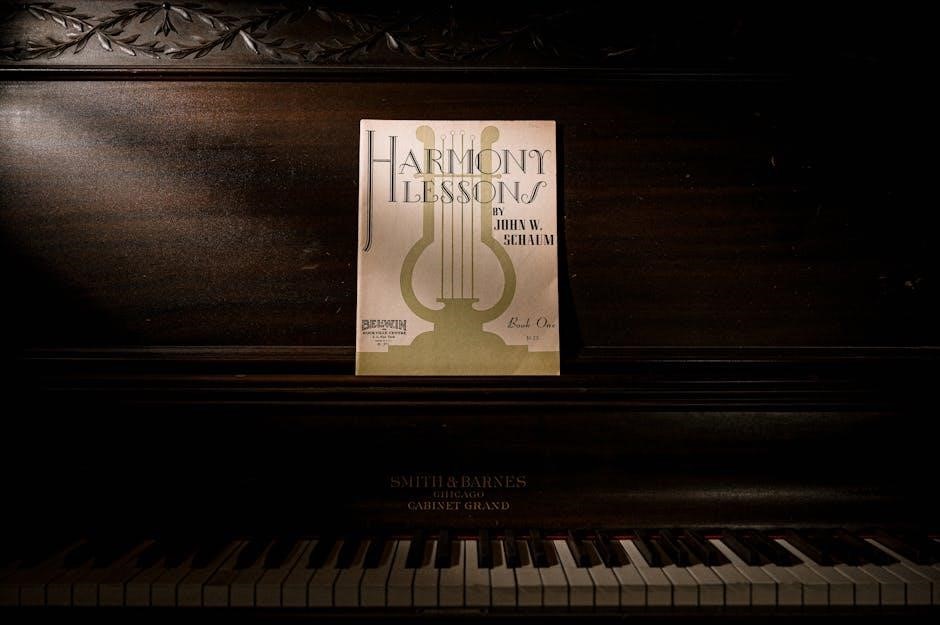The Pianist: An Overview of the Film

The Pianist is a 2002 historical drama film directed by Roman Polanski, based on the memoir by Władysław Szpilman. Starring Adrien Brody, it recounts the survival of a Jewish pianist during WWII in Warsaw. The film won three Oscars and is celebrated for its poignant portrayal of resilience and humanity amidst war.

1.1 Historical Context and Background

The Pianist, directed by Roman Polanski, is set against the backdrop of World War II and the Nazi occupation of Poland. The film is based on the true story of Władysław Szpilman, a Jewish pianist who witnessed the invasion of Warsaw in 1939. As the war unfolded, Poland was divided between Nazi Germany and the Soviet Union, leading to the brutal suppression of its people. The Jewish community, in particular, faced unimaginable persecution, culminating in the creation of the Warsaw Ghetto in 1940. Szpilman’s memoir, on which the film is based, provides a harrowing account of life under Nazi rule, including the liquidation of the ghetto and the subsequent atrocities committed during the war. The film captures the societal collapse and the personal struggles of individuals like Szpilman, who fought to survive against overwhelming odds. Polanski’s own experiences as a Holocaust survivor lend authenticity to the film’s portrayal of this dark period in history. The Pianist serves as a powerful reminder of the resilience of the human spirit and the atrocities of war, offering a glimpse into one of the most tragic chapters of the 20th century.
1.2 Roman Polanski’s Direction and Vision

Roman Polanski’s direction in The Pianist is deeply personal and evocative, reflecting his own experiences as a Holocaust survivor. Polanski’s vision was to create a film that would honor the true story of Władysław Szpilman while maintaining historical authenticity. His meticulous attention to detail ensures that every frame captures the brutality and despair of life under Nazi occupation. The film’s black-and-white cinematography was a deliberate choice to emphasize the stark reality of the era, avoiding the distraction of color and focusing on the emotional weight of the story. Polanski’s pacing is measured, allowing the audience to absorb the gravity of Szpilman’s journey without rushing through the narrative. He masterfully balances moments of intense action with quiet, reflective scenes, highlighting the internal and external struggles of the protagonist. Polanski’s direction also emphasizes the moral complexity of survival, exploring themes of luck, humanity, and resilience. His commitment to authenticity is evident in the film’s historical accuracy, from the recreation of the Warsaw Ghetto to the depiction of Nazi atrocities. The Pianist is a testament to Polanski’s skill as a filmmaker and his ability to translate a harrowing true story into a cinematic masterpiece. His work earned widespread critical acclaim, including the Palme d’Or and an Academy Award for Best Director.
1.3 Adrien Brody’s Portrayal of Władysław Szpilman
Adrien Brody’s portrayal of Władysław Szpilman in The Pianist is widely regarded as one of the most compelling performances in cinematic history. Brody immersed himself in the role, shedding significant weight to reflect Szpilman’s physical and emotional deterioration during the war. His performance captures the essence of a man torn between his passion for music and the harsh realities of survival. Brody’s ability to convey vulnerability, fear, and hope resonated deeply with audiences, earning him the Academy Award for Best Actor. His commitment to the role extended beyond acting; he learned to play the piano proficiently, ensuring authenticity in scenes where Szpilman’s music becomes a lifeline. Brody’s interpretation humanizes Szpilman, transforming him from a historical figure into a relatable character. His performance is praised for its subtlety, avoiding melodrama while conveying the profound emotional depth of the story. Brody’s collaboration with Roman Polanski was crucial, as the director’s vision guided him to deliver a nuanced and powerful portrayal. His role in The Pianist remains a landmark in his career, showcasing his talent and dedication as an actor. Brody’s performance not only honors Szpilman’s legacy but also ensures that his story continues to resonate with future generations.

The Pianist PDF: Key Resources and Downloads
The Pianist screenplay by Ronald Harwood and Władysław Szpilman’s memoir are available as PDF downloads. Fans can access the script for free on platforms like 8FLiX; Additionally, sheet music from the film’s score can be downloaded, allowing pianists to play iconic pieces from the movie.
2.1 The Screenplay by Ronald Harwood
The screenplay for The Pianist, written by Ronald Harwood, is a masterful adaptation of Władysław Szpilman’s memoir. Harwood’s script captures the emotional depth and historical significance of Szpilman’s survival during WWII. The screenplay is available as a PDF download, offering insights into the film’s narrative structure and dialogue. Fans and scholars can study the script to understand how Harwood translated the memoir into a cinematic experience. Platforms like 8FLiX provide free access to the screenplay, making it a valuable resource for those interested in screenwriting or the film’s production. Harwood’s work earned widespread acclaim, contributing to the film’s three Academy Awards. His ability to balance the harrowing realities of war with moments of hope and humanity is evident throughout the script. The PDF version of the screenplay is a must-read for anyone exploring the creative process behind this iconic film.
2.2 The Original Memoir by Władysław Szpilman

Władysław Szpilman’s memoir, The Pianist: The Extraordinary True Story of One Man’s Survival in Warsaw, 1939-1945, is the foundation of the film. Written shortly after WWII, it chronicles Szpilman’s harrowing experiences as a Jewish pianist in Nazi-occupied Warsaw. The memoir provides a raw, personal account of survival, detailing his life in the Warsaw Ghetto and beyond. Available as a PDF, the book offers a deeply moving and historically significant narrative. Readers gain insight into Szpilman’s resilience and the atrocities of war through his vivid storytelling. The memoir has been widely acclaimed for its unflinching honesty and emotional depth. It serves as a crucial historical document, shedding light on the struggles faced by Jews during the Holocaust. The PDF version allows readers to access this important work easily, ensuring its legacy endures. Szpilman’s story, as told in his memoir, remains a powerful testament to human endurance and hope in the face of unimaginable adversity.

2.3 Musical Scores and Sheet Music

The musical scores from The Pianist are a poignant complement to the film’s narrative, evoking the emotional depth of Władysław Szpilman’s journey. Composed by Wojciech Kilar, the film’s soundtrack features haunting melodies that underscore the struggles and triumphs of the protagonist. The score, including the iconic piece “The Pianist”, has been widely acclaimed for its ability to convey the complexity of human emotion during wartime. For those interested in exploring the music further, sheet music for the film’s score is available in PDF format, allowing pianists and musicians to interpret and perform these powerful pieces. Additionally, the original compositions by Szpilman himself, which are central to his story, can also be found in PDF resources, offering a deeper connection to the man and his art. These musical elements not only enhance the film but also provide a tangible way to engage with its themes of resilience and hope. By accessing these scores and sheet music, enthusiasts can delve into the musical heart of The Pianist, further enriching their understanding of this extraordinary story.